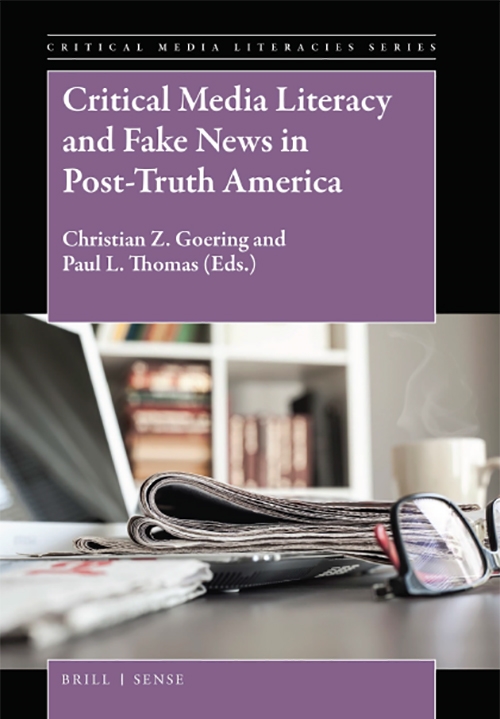A new book co-edited by University of Arkansas professor Chris Goering offers middle, high school and college teachers advice, perspective, theory and classroom activities for teaching their students to be media savvy.
The Brill Sense publisher series editor wrote in the book's foreword that it was prompted by President Donald Trump's election and the way he personifies the media as evil in an attempt to destroy the freedom of the press and free speech. According to series editor William M. Reynolds of Georgia Southern University, media culture is not discussed in school although the importance of students developing critical media literacy is plain from recent events.
Goering, an associate professor of English education, directs the Northwest Arkansas Writing Project based in the College of Education and Health Professions. The new book, Critical Media Literacy and Fake News in Post-Truth America, is part of the "Critical Media Literacies" series by Brill Sense. Paul Thomas, a professor of education at Furman University, co-edited it.
Goering and Thomas say in the book's introduction that it is not so much a response to the 2016 presidential election as a response to the issues highlighted through that single event and misinformation campaigns associated with it. They discuss the rapidly changing definition of fake news and the challenge of finding and validating sources of information.
"To participate in a democracy requires unprecedented media literacy skills today and our book lays out the fact that these skills have lagged behind other countries in terms of what happens in school," Goering said. "Our priorities must change to reflect the way communication is changing, and teaching the current school-aged generation to be more savvy consumers and creators of media should become an absolute priority."
Goering and Thomas quote two researchers from UCLA in defining critical media literacy for their book. It is an educational response that expands the notion of media literacy to include different forms of mass communication, popular culture and new technologies and focuses on the ideology critique and analyzing the politics of representation of crucial dimensions of gender, race, class and sexuality.
Contributors to the book include professors of English education, social studies education, communication and English as well as K-12 teachers. Several chapters contain practical advice and suggested lessons for teachers to use in their classrooms, particularly those who teach writing.
The chapter written by Troy Hicks, a professor of English and education at Central Michigan University, and Kristen Hawley Turner, an associate professor of teacher education at Drew University, outlines the MINDFUL method they created. How to be mindful readers and writers of social media:
- Monitor your reading and writing
- Identify your claim
- Note the evidence
- Determine the framework and mindset
- Focus on the facts
- Understand the counterargument
- Leverage your response
Jason Endacott, another U of A associate professor who teaches social studies education, wrote one of the book's chapters, "Before You Click 'Share': Mindful Media Literacy as a Positive Civic Act," with Matthew Dingler and Seth French, both U of A graduate students in curriculum and instruction, and John Broome, associate professor of education at the University of Mary Washington.
"The continued propagation of fake news despite our awareness of it raises questions about the possibility of our living in a post truth world," they write. "The purpose of this chapter is to provide educators with a guide for engaging students in a critical inquiry into the validity of source material, the credibility of information presented in source material, and sharing on social media as a positive civic action."
Topics
Contacts
Heidi S. Wells, director of communications
College of Education and Health Professions
479-575-3138,
